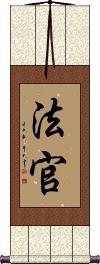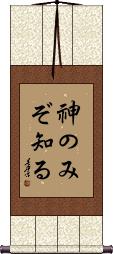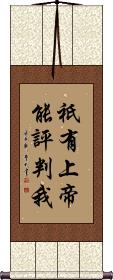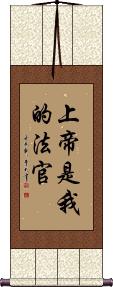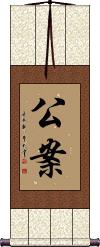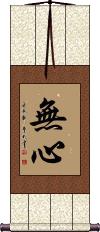Many custom options...
And formats...

Judge in Chinese / Japanese...
Buy a Judge calligraphy wall scroll here!
Personalize your custom “Judge” project by clicking the button next to your favorite “Judge” title below...
Judge
法官 is the written title used to refer to Judges in the legal court system in China, Japan, and ancient Korea (the same word used but now written differently in modern Korea).
Only God Can Judge Me
Only God Can Judge Me
God is my Judge
Koan
In the Buddhist context, 公案 is a Zen question for meditation.
From the Buddhist dictionary, this is:
Problems set by Zen masters, upon which thought is concentrated as a means to attain inner unity and illumination.
The secular meaning of this word can mean a judge's desk, a complex legal case, a contentious issue, a dossier, a case record, public laws, regulations, or case law.
Impartial and Fair to the Brotherhood and Sisterhood of the World
一視同仁 is how to write “universal benevolence.” This is also how to express the idea that you see all people the same.
If you are kind and charitable to everyone, this is the best way to state that virtue. It is the essence of being impartial to all mankind, regardless of social standing, background, race, sex, etc. You do not judge others, but instead, you see them eye to eye on the same level as you.
See Also: Benevolence | Compassion | Equality | Justice | Right Decision | Selflessness | Work Unselfishly for the Common
No Mind / Mushin
In Japanese, 無心 means innocent or without knowledge of good and evil. It literally means “without mind.”
無心 is one of the five spirits of the warrior (budo) and is often used as a Japanese martial arts tenet. Under that context, places such as the Budo Dojo define it this way: “No mind, a mind without ego. A mind like a mirror which reflects and dos not judge.” The original term was “mushin no shin,” meaning “mind of no mind.” It is a state of mind without fear, anger, or anxiety. Mushin is often described by the phrase “Mizu no Kokoro,” which means “mind like water.” The phrase is a metaphor describing the pond that clearly reflects its surroundings when calm but whose images are obscured once a pebble is dropped into its waters.
This has a good meaning in conjunction with Chan / Zen Buddhism in Japan. However, out of that context, it means mindlessness or absent-mindedness. To non-Buddhists in China, this is associated with doing something without thinking.
In Korean, this usually means indifference.
Use caution and know your audience before ordering this selection.
More info: Wikipedia: Mushin
These search terms might be related to Judge:
Not the results for judge that you were looking for?
Below are some entries from our dictionary that may match your judge search...
| Characters If shown, 2nd row is Simp. Chinese |
Pronunciation Romanization |
Simple Dictionary Definition |
公案 see styles |
gōng àn gong1 an4 kung an kouan / koan こうあん |
More info & calligraphy: Koan{Buddh} koan; kōan; Zen question for meditation (e.g. the sound of one hand clapping) J. kōan; 因緣 A dossier, or case-record; a cause; public laws, regulations; case-law. Problems set by Zen masters, upon which thought is concentrated as a means to attain inner unity and illumination. |
地獄 地狱 see styles |
dì yù di4 yu4 ti yü jigoku じごく |
More info & calligraphy: Hell(1) {Buddh} hell realm; Naraka; (2) {Christn} Hell; (3) hell; misery; nightmare; inferno; (4) place where a volcano or hot springs constantly spew smoke or steam; (place-name) Jigoku naraka, 捺落迦 (or 那落迦) ; niraya 泥犂; explained by 不樂 joyless; 可厭 disgusting, hateful; 苦具, 苦器 means of suffering; if 地獄 earth-prison; 冥府 the shades, or departments of darkness. Earth-prison is generally intp. as hell or the hells; it may also be termed purgatory; one of the six gati or ways of transmigration. The hells are divided into three classes: I. Central, or radical, 根本地獄 consisting of (1) The eight hot hells. These were the original hells of primitive Buddhism, and are supposed to be located umder the southern continent Jambudvīpa 瞻部州, 500 yojanas below the surface. (a) 等活 or 更活 Saṃjīva, rebirth, where after many kinds of suffering a cold wind blows over the soul and returns it to this life as it was before, hence the name 等活. (b) 黑繩 Kaslasūtra, where the sufferer is bound with black chains and chopped or sawn asunder. (c) 線合; 衆合; 堆壓 Saṃghāta, where are multitudes of implements of torture, or the falling of mountains upon the sufferer. (d) 號呌; 呼呼; 叫喚 Raurava, hell of wailing. (e) 大呌; 大號呌; 大呼 Mahāraurava, hell of great wailing. (f) 炎熱; 燒炙 Tapana, hell of fames and burning. (g) 大熱; 大燒炙; 大炎熱 Pratāpana, hell of molten lead. (h) 無間; 河鼻旨; 阿惟越致; 阿毗至; 阿鼻; 阿毗 Avīci, unintermitted suffering, where sinners die and are reborn to suffer without interval. (2) The eight cold hells 八寒地獄. (a) 頞浮陀地獄 Arbuda, where the cold causes blisters. (b) 尼刺部陀 Nirarbuda, colder still causing the blisters to burst. (c) 頞哳吒; 阿吒吒 Atata, where this is the only possible sound from frozen lips. (d) 臛臛婆; 阿波波 Hahava or Apapa, where it is so cold that only this sound can be uttered. (e) 虎虎婆 Hāhādhara or Huhuva, where only this sound can be uttered. (f) 嗢鉢羅; 鬱鉢羅 (or 優鉢羅) Utpala, or 尼羅鳥 (or 漚) 鉢羅 Nīlotpala, where the skin is frozen like blue lotus buds. (g) 鉢特摩 Padma, where the skin is frozen and bursts open like red lotus buds. (h) 摩訶鉢特摩 Mahāpadma, ditto like great red lotus buds. Somewhat different names are also given. Cf. 倶舍論 8; 智度論 16; 涅槃經 11. II. The secondary hells are called 近邊地獄 adjacent hells or 十六遊增 each of its four sides, opening from each such door are four adjacent hells, in all sixteen; thus with the original eight there are 136. A list of eighteen hells is given in the 十八泥梨經. III. A third class is called the 孤地獄 (獨地獄) Lokāntarika, or isolated hells in mountains, deserts, below the earth and above it. Eitel says in regard to the eight hot hells that they range 'one beneath the other in tiers which begin at a depth of 11,900 yojanas and reach to a depth of 40,000 yojanas'. The cold hells are under 'the two Tchahavālas and range shaft-like one below the other, but so that this shaft is gradually widening to the fourth hell and then narrowing itself again so that the first and last hell have the shortest, those in the centre the longest diameter'. 'Every universe has the same number of hells, ' but 'the northern continent has no hell whatever, the two continents east and west of Meru have only small Lokāntarika hells... whilst all the other hells are required for the inhabitants of the southern continent '. It may be noted that the purpose of these hells is definitely punitive, as well as purgatorial. Yama is the judge and ruler, assisted by eighteen officers and a host of demons, who order or administer the various degrees of torture. 'His sister performs the same duties with regard to female criminals, ' and it may be mentioned that the Chinese have added the 血盆池 Lake of the bloody bath, or 'placenta tank' for women who die in childbirth. Release from the hells is in the power of the monks by tantric means. |
法官 see styles |
fǎ guān fa3 guan1 fa kuan hougan / hogan ほうがん |
More info & calligraphy: Judgejudge; (surname) Hougan |
判 see styles |
pàn pan4 p`an pan wakatsu わかつ |
(bound form) to differentiate; to distinguish; (bound form) clearly (different); to judge; to decide; to grade; (of a judge) to sentence (1) (はん only) seal; stamp; monogram signature; (2) (はん only) judgment; judgement; (n,n-suf) (3) (See 判型・1) size (of paper or books); (given name) Wakatsu Divide, judge, decide. |
品 see styles |
pǐn pin3 p`in pin shina しな |
(bound form) article; commodity; product; goods; (bound form) grade; rank; kind; type; variety; character; disposition; nature; temperament; to taste something; to sample; to criticize; to comment; to judge; to size up; fret (on a guitar or lute) (1) court rank; (suffix) (2) {Buddh} (sometimes pronounced ぼん, ぽん as a suffix) (See 九品・1) level; grade; (suffix) (3) {Buddh} chapter; section; volume; (surname) Shina varga, 跋渠 class, series, rank, character; a chapter of a sutra. |
審 审 see styles |
shěn shen3 shen shin しん |
to examine; to investigate; carefully; to try (in court) (male given name) Shin To try, judge, examine. |
斷 断 see styles |
duàn duan4 tuan dan |
to break; to snap; to cut off; to give up or abstain from something; to judge; (usu. used in the negative) absolutely; definitely; decidedly uccheda; to cut off, end, get rid of, cause to cease; decide, decidedly. |
案 see styles |
àn an4 an an あん |
(legal) case; incident; record; file; table (n,n-suf) (1) idea; plan; proposal; suggestion; (government) bill; (2) draft; rough copy; (3) expectation; (4) (archaism) desk; stand; (female given name) Tsukue A judge's desk; a case at law. |
評 评 see styles |
píng ping2 p`ing ping hyou / hyo ひょう |
to discuss; to comment; to criticize; to judge; to choose (by public appraisal) (n,n-suf) criticism; commentary; review Criticize, discuss. |
諟 𬤊 see styles |
shì shi4 shih |
to examine; to judge |
諦 谛 see styles |
dì di4 ti tai たい |
to examine; truth (Buddhism) {Buddh} satya; truth; (given name) Tai To judge, examine into, investigate, used in Buddhism for satya, a truth, a dogma, an axiom; applied to the āryasatyāni, the four dogmas, or noble truths, of 苦, 集, 滅, and 道 suffering, (the cause of its) assembly, the ( possibility of its cure, or) extinction, and the way (to extinction), i.e. the eightfold noble path, v. 四諦 and 八聖道. There are other categories of 諦, e.g. (2) 眞 and 俗 Reality in contrast with ordinary ideas of things; (3) 空, 假 and 中 q.v. (6) by the 勝論宗; and(8) by the 法相宗.; Two forms of statement: (a) 俗諦 saṃvṛti-satya, also called 世諦, 世俗諦, 覆俗諦, 覆諦, meaning common or ordinary statement, as if phenomena were real; (b) 眞諦 paramartha-satya, also called 第一諦, 勝義諦, meaning the correct dogma or averment of the enlightened. Another definition is 王法 and 佛法, royal law and Buddha law. |
騭 骘 see styles |
zhì zhi4 chih |
a stallion; to rise; to arrange; to stabilize; to differentiate; to judge |
下す see styles |
kudasu くだす orosu おろす |
(transitive verb) (1) to make a decision; to draw a conclusion; (2) to judge; to hand down a verdict; to pass sentence; (3) to let go down; to lower; (4) to do oneself; to do by oneself; (5) to beat; to defeat; (6) to have loose bowels; to have diarrhea; to pass excrement; (irregular okurigana usage) (transitive verb) (1) to take down (e.g. flag); to launch (e.g. boat); to drop; to lower (e.g. ladder); to let (a person) off; to unload; to discharge; (2) to drop off (a passenger from a vehicle); to let (a person) off; (3) to withdraw money from an account; (4) to wear (clothing) for the first time; (5) to fillet (e.g. a fish) |
伯楽 see styles |
hakuraku はくらく |
(sensitive word) cattle or horse trader; good judge of horses or cattle; (given name) Hakuraku |
判事 see styles |
hanji はんじ |
judge; judiciary |
判士 see styles |
hanshi はんし |
judge advocate |
判官 see styles |
pàn guān pan4 guan1 p`an kuan pan kuan hougan / hogan ほうがん |
magistrate (during Tang and Song dynasties); mythological underworld judge (1) (はんがん only) judge; magistrate; (2) (archaism) (See 四等官,尉・じょう・1) 3rd grade official (ritsuryō system); assistant district officer; inspector; (person) Minamoto-no-Yoshitsune (nickname) |
判定 see styles |
pàn dìng pan4 ding4 p`an ting pan ting hantei / hante はんてい |
to judge; to decide; judgment; determination (noun, transitive verb) judgement; judgment; decision; ruling; finding; adjudication; verdict; call |
判斷 判断 see styles |
pàn duàn pan4 duan4 p`an tuan pan tuan handan |
to judge; to determine; judgment to decide |
判者 see styles |
hanja はんじゃ |
judge (of literary contests) |
包公 see styles |
bāo gōng bao1 gong1 pao kung |
Lord Bao or Judge Bao, fictional nickname of Bao Zheng 包拯[Bao1 Zheng3] (999-1062), Northern Song official renowned for his honesty |
十王 see styles |
shí wáng shi2 wang2 shih wang juuou / juo じゅうおう |
{Buddh} ten rulers of the afterlife (who judge the dead and determine their placement in their next life); (place-name, surname) Jūou The ten kings presiding over the ten departments of purgatory. |
博労 see styles |
bakurou / bakuro ばくろう |
(sensitive word) cattle or horse trader; good judge of horses or cattle; (place-name) Bakurou |
司直 see styles |
shichoku しちょく |
judge; judiciary; administration of justice; judicial authorities |
品評 品评 see styles |
pǐn píng pin3 ping2 p`in p`ing pin ping hinpyou / hinpyo ひんぴょう |
to judge; to assess (noun, transitive verb) estimation; criticism; comment |
品議 品议 see styles |
pǐn yì pin3 yi4 p`in i pin i |
to judge |
品鑒 品鉴 see styles |
pǐn jiàn pin3 jian4 p`in chien pin chien |
to judge; to examine; to evaluate |
回避 see styles |
huí bì hui2 bi4 hui pi kaihi かいひ |
variant of 迴避|回避[hui2 bi4] (n,vs,vi) (1) evasion; avoidance; (n,vs,vi) (2) {law} recusal (of a judge) |
士師 see styles |
hashi はし |
(1) (hist) judge (of ancient China); (2) (hist) (See 士師記) judge (leader of ancient Israel); (surname) Hashi |
外協 外协 see styles |
wài xié wai4 xie2 wai hsieh |
outsourcing; people who judge others by their looks (abbr. for 外貌協會|外貌协会[wai4 mao4 xie2 hui4]) |
Click here for more judge results from our dictionary
The following table may be helpful for those studying Chinese or Japanese...
| Title | Characters | Romaji (Romanized Japanese) | Various forms of Romanized Chinese | |
| Judge | 法官 | hou kan / houkan / ho kan | fǎ guān / fa3 guan1 / fa guan / faguan | fa kuan / fakuan |
| Only God Can Judge Me | 神のみぞ知る | kami nomi zo shiru kaminomizoshiru | ||
| Only God Can Judge Me | 衹有上帝能評判我 只有上帝能评判我 | zhǐ yǒu shàng dì néng píng pàn wǒ zhi3 you3 shang4 di4 neng2 ping2 pan4 wo3 zhi you shang di neng ping pan wo | chih yu shang ti neng p`ing p`an wo chih yu shang ti neng ping pan wo |
|
| God is my Judge | 上帝是我的法官 | shàng dì shì wǒ de fǎ guān shang4 di4 shi4 wo3 de fa3 guan1 shang di shi wo de fa guan shangdishiwodefaguan | shang ti shih wo te fa kuan shangtishihwotefakuan |
|
| Koan | 公案 | kouan / koan | gōng àn / gong1 an4 / gong an / gongan | kung an / kungan |
| Impartial and Fair to the Brotherhood and Sisterhood of the World | 一視同仁 一视同仁 | isshidoujin ishidojin | yí shì tóng rén yi2 shi4 tong2 ren2 yi shi tong ren yishitongren | i shih t`ung jen ishihtungjen i shih tung jen |
| No Mind Mushin | 無心 无心 | mu shin / mushin | wú xīn / wu2 xin1 / wu xin / wuxin | wu hsin / wuhsin |
| In some entries above you will see that characters have different versions above and below a line. In these cases, the characters above the line are Traditional Chinese, while the ones below are Simplified Chinese. | ||||
Successful Chinese Character and Japanese Kanji calligraphy searches within the last few hours...
